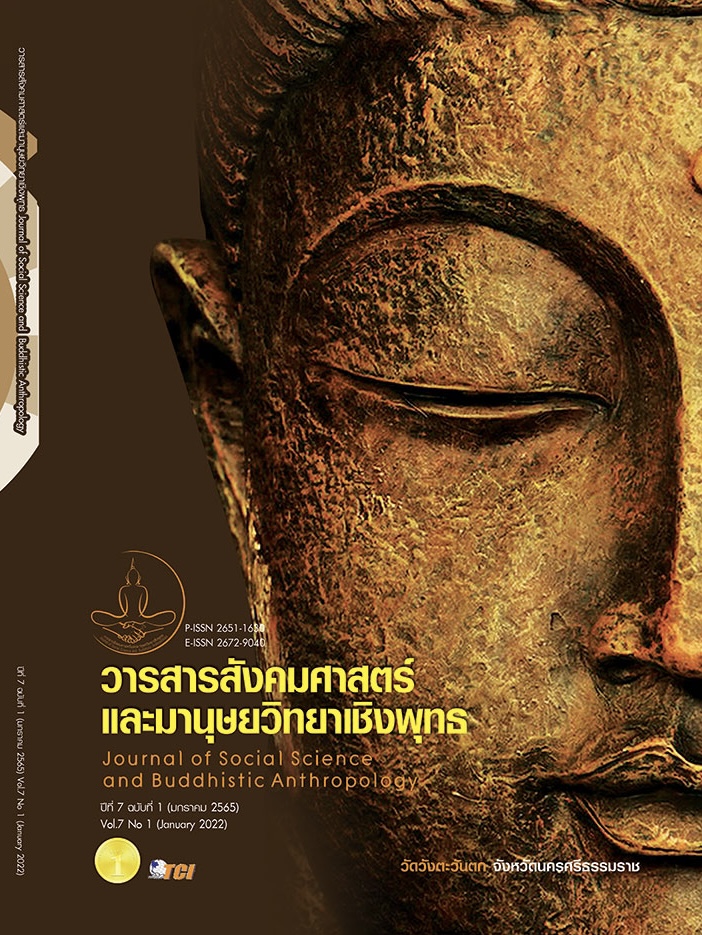STRUCTURAL EQUATION MODEL OF IMPACT TO ORGANIZATIONAL LOYALTY OF OPERATIONAL EMPLOYEES IN PRIVATE ORGANIZATION IN BANGKOK METROPOLITAN REGION
Keywords:
Structural Equation Model, Organizational Climate, Job Satisfaction, Administrative Factors, LoyaltyAbstract
The objectives of this research article were to develop a structural equation model of impact to organizational loyalty of operational employees in private organizations. The quantitative research method was used to verify the consistency of the model from collecting data with 500 private organization employees in Bangkok metropolitan region using multi-stage sampling. The questionnaire was built on the concept of modeling and confirmatory factor analysis includes organizational climate factors, job satisfaction factors, administrative factors, precipitating factors, maintenance factors, and corporate loyalty factors. The structural equation model of influencing to corporate loyalty of operational employees in the Bangkok metropolis and vicinity was developed had consistent with empirical data (p = 0.142, CMIN/DF = 1.951, GFI = 0.996, TLI = 0.959, CFI = 0.953, NFI = 0.916, RMSEA = 0.044). Organizational climate, job satisfaction, and administrative factors had a positive influence on precipitating and maintenance factors and precipitating and maintenance factors had a positive influence on corporate loyalty as well. The variation of precipitating factors was Influenced by organizational climate, job satisfaction, and administrative factors 13%, same as maintenance factors were Influenced by these factors 11% as well as corporate loyalty was Influenced by precipitating and maintenance factors 25%.
References
ชลธิชา ทิพย์ประทุม. (2561). การพัฒนาโมเดลรางวัลภายในเพื่อเสริมสร้างพฤติกรรมความจงรักภักดีต่อองค์การและผลการปฏิบัติงานของพนักงานในอุตสาหกรรมซอฟต์แวร์ในประเทศไทย. วารสารวิชาการ มทร.สุวรรณภูมิ(มนุษย์ศาสตร์และสังคมศาสตร์, 4(2), 140-153.
ชลธิชา ทิพย์ประทุม. (2561). รางวัลภายในขององค์กรธุรกิจ: ปัจจัยเชิงสาเหตุและผลลัพธ์. วารสารบริหารธุรกิจเทคโนโลยีมหานคร, 15(1), 240-254.
ชลธิชา ทิพย์ประทุม เเละคณะ. (2562). การพัฒนาโมเดลการสนับสนุนแรงเสริมและรางวัลภายในที่ส่งผลต่อพฤติกรรมความจงรักภักดีต่อองค์การและผลการปฏิบัติงานของพนักงานในอุตสาหกรรมซอฟต์แวร์ในประเทศไทย. วารสารการบัญชีและการจัดการ คณะการบัญชีและการจัดการ มหาวิทยาลัยมหาสารคาม, 11(2), 214-229.
ญาณกร ภิญญูวรเมธ และอนุรักษ์ เรืองรอบ. (2560). ปัจจัยการบริหารที่มีผลต่อความจงรักภักดีของพนักงานร้านจำหน่ายสินค้าตกแต่งบ้านในเขตเมืองพัทยา จังหวัดชลบุรี. วารสารบัณฑิตศึกษา มหาวิทยาลัยราชภัฏวไลยอลงกรณ์ในพระบรมราชูปถัมภ์, 11(ฉบับพิเศษ), 14-23.
ณัฏฐพันธ์ เขจรนันทน์. (2551). พฤติกรรมองค์การ. กรุงเทพมหานคร: ซีเอ็ดยูเคชั่น.
นันทพร ชวนชอบ. (2560). ปัจจัยที่ส่งผลให้บุคลากรมีความจงรักภักดีกับองค์การอย่างยั่งยืนกรณีศึกษา กองบริหารทรัพยากรบุคคล. ใน วิทยานิพนธ์รัฐศาสตรมหาบัณฑิต สาขาบริหารรัฐกิจและกิจการสาธารณะ สำหรับนักบริหาร. มหาวิทยาลัยธรรมศาสตร์.
นิยดา เปี่ยมพืชนะ. (2559). โมเดลปัจจัยเชิงสาเหตุที่มีอิทธิพลต่อประสิทธิผลการจัดการศึกษาระดับอุดมศึกษาของสถาบันอุดมศึกษาเอกชนในภาคตะวันออกเฉียงเหนือ. วารสารราชพฤกษ์ บัณฑิตวิทยาลัย มหาวิทยาลัยราชภัฏนครราชสีมา, 14(1), 25-35.
ภาวิณี เพชรสว่าง. (2552). พฤติกรรมองค์การ. (พิมพ์ครั้งที่ 5). กรุงเทพมหานคร: โรงพิมพ์ซีวีแอลการพิมพ์.
มาลิณี ศรีไมตรี เเละคณะ. (2562). อิทธิพลของภาวะผู้นำการเปลี่ยนแปลงวัฒนธรรมองค์การ ความพึงพอใจในการทำงาน ความผูกพันต่อองค์การที่ส่งผลต่อพฤติกรรมการเป็นสมาชิกที่ดีขององค์การของพนักงานในสถานประกอบการวิสาหกิจขนาดกลางและขนาดย่อม (ภาคการผลิต) เขตภาคตะวันออกเฉียงเหนือตอนล่าง 2. Journal of HR Intelligence, 14 (1), 45-67.
ยุทธ์ ไกยวรรณ์. (2556). การวิเคราะห์สถิติหลายตัวแปรสำหรับงานวิจัย. กรุงเทพมหานคร: สำนักพิมพ์แห่งจุฬาลงกรณ์มหาวิทยาลัย.
วิภา จันทร์หล้า. (2559). ความจงรักภักดีของพนักงานที่มีต่อบริษัทโตโยด้า โกเซ เอเชีย จำกัด จังหวัดชลบุรี. ใน วิทยานิพนธ์การศึกษามหาบัณฑิต สาขาวิชาการบริหารการศึกษา. มหาวิทยาลัยบูรพา.
สรียา บุญธรรม. (2558). บรรยากาศองค์การพฤติกรรมการเป็นสมาชิกที่ดีขององค์การและความพึงพอใจในงาน: กรณีศึกษาโรงแรมสามพรานริเวอร์ไซด์จังหวัดนครปฐม. ใน วิทยานิพนธ์ศิลปศาสตรมหาบัณฑิต สาขาวิชาจิตวิทยาอุตสาหกรรมและองค์การ ภาควิชาจิตวิทยา. มหาวิทยาลัยธรรมศาสตร์.
สุพิชญา อาชวิรดา. (2559). ปัจจัยที่ส่งผลต่อระดับการรักษาความมั่นคงปลอดภัยของระบบสารสนเทศในองค์กร. วารสารระบบสารสนเทศด้านธุรกิจ, 2(2), 66-79.
อนิวัช แก้วจํานงค์. (2552). การจัดการทรัพยากรมนุษย์ = Human resource management. สงขลา: ศูนย์หนังสือมหาวิทยาลัยทักษิณ.
อัครัช แสนสิงห์. (2560). บรรยากาศองค์กรที่มีผลต่อแรงจูงใจใฝ่สัมฤทธิ์ในการทำงานของพนักงานประจำสำนักงาน บริษัทเดอะมอลล์กรุ๊ป จำกัด สาขานครราชสีมา. ใน วิทยานิพนธ์บริหารธุรกิจมหาบัณฑิต สาขาวิชาบริหารธุรกิจ. มหาวิทยาลัยเทคโนโลยีราชมงคลอีสาน.
Kline, R. B. (2010). Principles and practice of structural equation modeling. (3rd ed.). New York: Guilford Press.
Anderson, J. C. & Gerbing, D. W. (1988). Structural equation modeling in practice: a review and recommended two-step approach . Psychological Bulletin, 103(3), 411-423.
Chen, Y. S. et al. (2006). The influence of green innovation performance on corporate advantage in Taiwan. Journal of Business Ethics, 67(4), 331-339.
Chester, I. B. (1938). The function of an executive. Cambridge: Harvard University Press.
Comrey, A. L. & Lee, H. B. (1992). A first course in factor analysis. Hillsdale, NJ.: Lawrence Erlbaum.
Comrey, A. L. (1973). A first course in factor analysis. New York: Academic Press.
Crano, W. D. et al. (2015). Principles and methods of social research. (3rd ed). New York: Routledge.
Drydakis, N. (2017). Trans employees, transitioning, and job satisfaction. Journal of Vocational Behavior, 98(February 2017), 1-16.
Frederick, H. et al. (1959). The Motivation of work. New York: John Wiley & Sons.
Hair, J. et al. (2010). Multivariate data analysis. (7thed.). New Jersey: Upper saddle River.
Hair, J. et al. (2006). Multivariate data analysis. (6th ed.). Englewood Cliffs, NJ: Prentice Hall.
Hatice. (2012). The influence of intrinsic and extrinsic rewards on employee results : An empirical analysis in turkish manufacturing industry. Article in Business and Economics Research Journal, 3(3), 29-48.
Henseler, J. et al. (2009). The use of partial least squares path modeling in International Marketing. Advances in International Marketing, 20(1), 277-319.
Maslow, A. H. (1954). Motivation and personality. New York: Harpers and Row.
McClelland, D. C. (1962). Business Drive and National Achievement. New York: D. Van Nostrand.
Robbins, S. P. & Coulter, M. K. (2007). Fundamentals of management. (7th ed.). Upper Saddle River, NJ: Pearson-Prentice Hall.
Schumacher, R. E. & Lomax, R. G. (2010). A beginners guide to structural equation modeling: SEM. NewJersey: Lawrence Erlbaum Associates.
Steers, R. M. & Porter, L. W. (1983). Motivation and work behavior (3rd ed.). New York: McGraw - Hill.
Thomas, W. & Tymon, G. (1982). Necessary properties of relevent research : Lessons from recent criticisms of the organizational science. Academy of Management Journal, 7(2), 345-352.
Downloads
Published
How to Cite
Issue
Section
License
Copyright (c) 2022 Journal of Social Science and Buddhistic Anthropology

This work is licensed under a Creative Commons Attribution-NonCommercial-NoDerivatives 4.0 International License.









